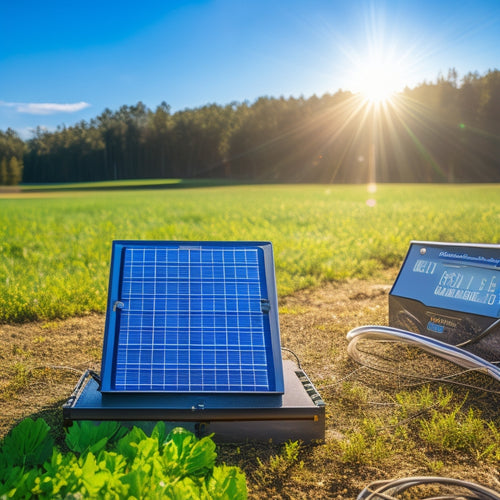
What Are Smart Energy Storage Solutions?
Share
By integrating advanced energy management systems with efficient storage solutions, such as solar batteries, you can optimize your energy usage, reduce energy waste, and minimize your reliance on the grid. Smart energy storage solutions allow you to store excess energy from renewable sources, reduce peak demand charges, and shift non-essential loads to off-peak hours, resulting in lower energy bills and a lower carbon footprint. With advanced technologies like lithium-ion batteries and effective depth of discharge management, you can reveal the full potential of smart energy storage solutions and take a significant step towards energy independence and sustainability – and that's just the beginning.
At a Glance
- Smart energy storage solutions optimize energy usage, reduce waste, and support sustainability by storing excess energy from renewable sources.
- These solutions utilize advanced technologies, such as lithium-ion batteries, to provide high energy density and long cycle life expectancy.
- Energy management systems integrated with smart grids enable data-driven decisions, real-time monitoring, and control over energy consumption.
- Smart energy storage solutions minimize energy loss by identifying and addressing inefficiencies, reducing peak demand, and shifting non-essential loads to off-peak hours.
- They promote sustainability by reducing reliance on the grid, enhancing energy independence, and supporting carbon footprint reduction through renewable energy integration.
Reduce Energy Waste Today
You can markedly reduce energy waste by optimizing your energy usage and minimizing energy loss.
For instance, by utilizing renewable energy with efficient power storage solutions, such as a high-quality solar battery, you can store excess energy generated by your solar panels and use it when you need it most.
To achieve this, you'll need to identify areas where energy is being inefficiently used and implement corrective measures.
Optimize Energy Usage
Optimizing energy usage is vital in the modern era, where energy waste has become a significant concern. You play an important role in reducing energy waste by adopting smart energy storage solutions that optimize energy usage.
Energy management systems, which are integrated with smart grids, enable you to monitor and control your energy consumption in real-time. This allows you to identify areas of inefficiency and make data-driven decisions to reduce energy waste.
By leveraging renewable energy storage and advanced battery systems, you can store excess energy generated from renewable sources and reduce your reliance on the grid. With solar energy storage, you can alleviate the burden of high energy bills and reduce grid dependence, providing yourself with greater energy independence and potential cost savings.
By optimizing energy usage, you can reduce your carbon footprint, lower your energy bills, and contribute to a more sustainable future. With smart energy storage solutions, you can store excess energy generated from renewable sources, such as solar or wind power, and use it when needed, reducing your reliance on the grid.
Minimize Energy Loss
Minimizing energy loss is essential to reducing energy waste, as it can account for a noteworthy portion of your overall energy consumption. You can achieve this by identifying and addressing inefficiencies in your energy system.
One way to do this is by implementing energy-efficient technologies and practices. For instance, you can upgrade to energy-efficient appliances and lighting systems, which can greatly reduce energy waste.
In addition, you can optimize your energy usage patterns by shifting non-essential loads to off-peak hours. By utilizing Renewable Energy Solutions, you can reduce your reliance on fossil fuels and minimize energy waste.
Moreover, incorporating Lithium Ion Batteries into your energy system can help store excess energy generated by renewables and release it when needed. This not only reduces energy waste but also enhances energy efficiency.
Lower Your Energy Bills
By implementing smart energy storage solutions, you can reduce peak demand and optimize energy usage, resulting in lower energy bills.
With integrated solar panel energy storage solutions off grid solar systems, you can maximize your renewable energy savings and have a reliable backup power solution.
This is achieved by shifting non-essential loads to off-peak hours, reducing the strain on the grid during peak periods.
Reduce Peak Demand
You can considerably reduce peak demand charges by shifting your energy usage patterns. This is especially important for commercial and industrial consumers who face hefty demand response charges during peak hours.
By optimizing your energy management strategy, you can reduce your peak demand and lower your energy bills.
Smart energy storage solutions enable you to do just that. With advanced energy management systems, you can monitor and control your energy usage in real-time. This allows you to identify periods of high energy demand and shift non-essential loads to off-peak hours.
By doing so, you can reduce your peak demand charges and lower your overall energy costs.
Moreover, smart energy storage solutions can also provide backup power during outages, ensuring business continuity and minimizing losses.
By implementing a smart energy storage solution, you can take control of your energy usage, reduce your peak demand, and enjoy significant cost savings.
With the right energy management strategy, you can optimize your energy usage and achieve energy independence.
Optimize Energy Usage
Shifting non-essential loads to off-peak hours not only reduces peak demand charges but also opens up opportunities to optimize your energy usage patterns. By doing so, you can take advantage of lower energy rates and minimize your energy bills. With smart energy storage solutions, you can optimize your energy usage in various ways:
| Energy Management | Benefits | Technology |
|---|---|---|
| Load Balancing | Reduces peak demand charges | Advanced algorithms |
| Renewable Integration | Increases renewable energy usage | Smart inverters |
| Demand Response | Optimizes energy usage patterns | IoT-enabled devices |
| Storage Efficiency | Maximizes energy storage capacity | Advanced battery management |
Lithium-Ion Battery Technology
You're likely familiar with the impressive energy storage capabilities of lithium-ion batteries, which boast high energy density advantages that enable them to pack a lot of power into a small space.
This means you can store more energy in a smaller, lighter battery, making them ideal for a range of applications, including off-grid energy systems and commercial use cases that require reliable power storage solutions.
Additionally, many solar panel battery systems rely on lithium-ion batteries due to their high performance.
Lithium-ion batteries have a long cycle life expectancy, allowing them to charge and discharge hundreds of times without losing their effectiveness.
Energy Density Advantages
Tapping into the potential of lithium-ion battery technology, one of the most significant advantages lies in its exceptional energy density. This means you can store more energy per unit of weight and volume, making it an ideal solution for smart energy storage.
With a higher energy density, you can power your devices and systems for longer periods without the need for frequent recharging. This translates to increased storage efficiency, allowing you to make the most of your energy resources.
In practical terms, lithium-ion batteries offer a significant upgrade in energy density compared to traditional battery technologies. For instance, you can store up to 250 Wh/kg of energy in a lithium-ion battery, compared to just 40 Wh/kg in a lead-acid battery.
This increased energy density enables the development of more compact and efficient energy storage systems, perfect for applications where space is limited. By leveraging the energy density advantages of lithium-ion battery technology, you can access new possibilities for smart energy storage and enjoy greater freedom and flexibility in your energy usage.
Cycle Life Expectancy
Because lithium-ion batteries are subjected to repeated charge and discharge cycles, their cycle life expectancy plays an essential role in determining their overall performance and reliability.
As you consider smart energy storage solutions, you'll want to understand the factors that affect cycle life. Proper battery maintenance, charging strategies, and environmental conditions all impact the lifespan of your lithium-ion battery. For instance, extreme temperatures, overcharging, and deep discharging can all reduce cycle life.
Cost considerations are also vital, as longer cycle life means fewer replacements and lower overall costs.
Fortunately, technology advancements have led to significant improvements in cycle life expectancy. Modern lithium-ion batteries can last for thousands of cycles, making them a viable option for a wide range of applications.
This versatility, combined with user experiences and industry trends, has driven the adoption of lithium-ion batteries in everything from electric vehicles to renewable energy systems.
Depth of Discharge Matters
When you're designing a smart energy storage system, you need to take into account the ideal depth of discharge (DOD) range for your lithium-ion batteries, particularly when paired with solar battery storage systems.
This is important because lithium-ion batteries are commonly used in home battery systems, and understanding their ideal DOD range is crucial for efficient energy storage.
If you're not careful, frequent deep cycles can greatly reduce the battery's lifespan, so it's important to strike a balance between maximizing energy storage and minimizing wear and tear.
Optimal DOD Range
By understanding the ideal depth of discharge (DOD) range, you'll maximize the lifespan and efficiency of your energy storage system. The best DOD range varies depending on the battery type and application, but generally falls between 20% and 80% of the battery's capacity.
Operating within this range guarantees you're not over-discharging or under-charging your batteries, which can lead to reduced lifespan and performance.
Effective battery management is essential in determining the best DOD range. By monitoring your battery's state of charge, voltage, and temperature, you can adjust your charging and discharging patterns to stay within the ideal range.
Capacity planning also plays a key role in determining the best DOD range, as it helps you size your energy storage system to meet your specific energy needs.
Avoiding Deep Cycles
You've optimized your energy storage system's depth of discharge (DOD) range, but now it's time to evaluate the impact of deep cycles on your batteries.
Deep cycles occur when your batteries are consistently drained to their maximum capacity, which can greatly reduce their lifespan. To avoid this, you need to implement a battery management strategy that guarantees your batteries are operating within a safe DOD range.
A good battery management system will monitor your energy usage patterns and adjust the charging and discharging cycles accordingly. This will help prevent deep cycles and reduce wear and tear on your batteries.
Higher Cycle Life Expectancy
You're looking for energy storage solutions that can withstand the test of time, and that's where higher cycle life expectancy comes in.
With longer battery durability, you can expect your energy storage system to perform consistently over thousands of charge and discharge cycles.
This means you'll get more bang for your buck and reduce the need for frequent replacements, ultimately saving you time and resources.
Longer Battery Durability
Your energy storage system's battery durability is a critical factor in determining its overall performance and lifespan. Longer battery durability translates to a higher number of charge and discharge cycles, reducing the need for frequent replacements. This, in turn, minimizes electronic waste and supports sustainability practices.
Recent battery innovations have led to significant advancements in energy storage technology. Advanced materials and design frameworks have improved the overall efficiency and lifespan of batteries. As a result, you can enjoy a longer battery life, reduced maintenance costs, and a lower total cost of ownership.
With a longer-lasting battery, you'll experience fewer interruptions in your energy supply, ensuring your freedom from reliance on the grid. Additionally, you can store excess energy generated from renewable sources, such as solar or wind power, and use it when needed, further reducing your carbon footprint.
Frequently Asked Questions
Can Smart Energy Storage Solutions Work With Existing Electrical Infrastructure?
You can seamlessly integrate smart energy storage solutions with your existing electrical infrastructure, but be prepared to tackle integration challenges and weigh cost considerations to guarantee a smooth, efficient, and cost-effective shift to a more liberated energy environment.
Are Energy Storage Solutions Compatible With Solar Panels?
As you utilize the sun's power, you'll find that energy storage solutions seamlessly integrate with solar panels, releasing solar collaboration and efficiency optimization, enabling you to break free from grid dependence and shine with renewable energy independence.
How Do Energy Storage Systems Handle Power Outages?
When the grid goes down, you'll rely on your energy storage system to keep the lights on; its battery efficiency and capacity determine how long it'll last, so you can plan for outage duration and stay powered up until the grid's back online.
Can I Customize Energy Storage Solutions for My Specific Needs?
You're likely aware that 70% of businesses experience power outages annually. Fortunately, you can personalize energy storage solutions to fit your unique needs, enjoying benefits like customized solutions that optimize performance, reduce costs, and guarantee reliable backup power when you need it most.
Do Energy Storage Solutions Require Regular Maintenance?
You'll want to perform routine checks to guarantee peak performance, as neglecting maintenance can reduce your battery lifespan and increase maintenance costs; however, many solutions are designed to minimize upkeep, giving you more freedom to focus on what matters.
Explore More
As you begin the expedition to optimize your energy usage, remember that smart energy storage solutions are the key to revealing a greener, more cost-effective future. By utilizing the power of lithium-ion battery technology and understanding the importance of depth of discharge and cycle life expectancy, you'll be well on your way to reducing energy waste and slashing your energy bills. The future is bright - and it's powered by smart energy storage.
Related Posts
-

Solar Phone Chargers for Camping Essentials
Solar phone chargers are must-haves for your camping essentials, allowing you to stay connected while enjoying nature...
-

Top Camping Water Bottles for Adventure
When you're out adventuring, picking the right camping water bottle is essential for staying hydrated. Look for durab...
-

Choosing the Right Solar Power Charge Controller
Choosing the right solar power charge controller is crucial for maximizing energy efficiency and extending battery li...


